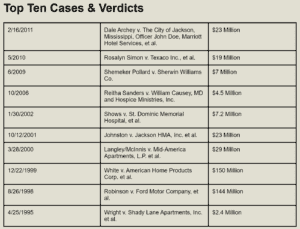
Claiborne County prosecutors have asked Circuit Judge Tomika Irving to sequester the jury in the May 2 capital murder retrial of Hattiesburg native T’kia Smith Bevily. If sequestered, the jury would remain in the custody of the Claiborne County Sheriff’s Office throughout the trial, with no access during the trial to mobile devices, the internet, or news presentations.
Tkia Bevily is accused of inflicting multiple blunt force injuries that caused the death of her 14-month-old stepdaughter, Jurayah Smith, in October 2017. Her husband, Morris Bevily, also faces capital murder charges. His court date is set for May 9.
Bevily’s first trial ended with a conviction and a life sentence. Judge Irving granted a new trial last September after learning that juror 24 did not disclose that he is Jurayah’s great uncle. Bevily’s trial attorney filed a post-trial motion containing several allegations of misconduct, but Judge Irving ruled on only one.
The judge will hear pre-trial motions from defense and prosecution attorneys Monday, April 4th. HPNM will broadcast that hearing live for subscribers. HPNM also will broadcast the May 2 retrial for subscribers. You can subscribe here.

WHY SEQUESTER? IT’S A SWEET SITUATION…
It’s rare these days that a jury is sequestered, but prosecutors appear to stand on solid ground with their request. They filed the motion because the new defense attorney, Dennis Sweet III, has a history of deceiving the trial court and of attempting to influence prospective jurors.
“…Dennis Sweet, III has been recently admonished in the matter of Hyundai Motor Am v. Applewhite…, where ample evidence was introduced before the Court that [he] improperly influenced a jury in that case, which in turn effectuated a result in favor of his client,” assistant district attorney Patrick Beasley wrote. “… Said behavior, if repeated by counsel opposite, could have similar results in the instant case of State v. T’Kia Beverly. However, the State is of the opinion that jury sequestration will effectively prevent this issue.”
Sweet is an extraordinarily successful civil attorney, having won more than $400 million in civil verdicts. However, that success was brought into question last year when the Mississippi Supreme Court reversed a $10.5 million settlement and ordered a new trial in the September 2014 wrongful death case against Hyundai. The Mississippi Supreme Court took those steps after evidence emerged that Sweet not only had engaged in jury interference but also lied to the trial court about his efforts to influence potential jurors during an April 2015 hearing on the matter.
The case in question involved a 1995 accident in which three occupants of a Hyundai Excel traveling south on Highway 61 crossed the center lane and collided with a Lincoln Continental that was traveling north. All three occupants of the Hyundai died. Family members of the three filed a wrongful death suit against Hyundai Motor America and Hyundai Motor Company, claiming the accident was caused by design flaws with the Hyundai Excel.
Sweet represented the plaintiffs at the first trial in 2008, winning a $4.5 million award, or $1.5 million for each of the three families. Hyundai appealed, and in 2011 the state Supreme Court ordered a new trial. Sweet also represented the plaintiffs at the second trial, held in September 2014.
Part of Sweet’s courtroom strategy involved hiring a consultant, a pastor from Chicago named Bishop Carey Sparks, to hold revivals in African American communities as a means of connecting with prospective jurors and their family members. (Bishop Sparks died March 1, 2021, after he was hit by a car while he was walking in Memphis.)
Ironically, Sparks ignited a full-blown investigation of the 2014 case by talking to several Hinds County attorneys – perhaps in an effort to drum up new business – about his work for Sweet. One of the attorneys reported the conversation and the trial court set a hearing for April 2015 to examine the alleged misconduct.
According to court transcripts, Sparks told one attorney that he served as as a consultant/investigator/case runner for Sweet, who hired him “to show up a couple of weeks before a trial in an area and preach revivals and get to know the people.”
He told another attorney that he “worked for Sweet and was…helping pick a jury.” The attorney testified that Sparks said that “Sweet paid him to go out and preach revivals two or three weeks out, when they pick a jury in different spots so that the jury would know him when they came in.”
The same attorney stated that Sparks said he worked with Sweet on a case in Clarksdale that should have been a $21 million verdict but was $10 million. (Sweet sought $7 million for each of three plaintiffs; the jury awarded $3.5 million to each.) The testifying attorney said Sparks commented that there were “a lot of uneducated people up that way. People couldn’t read and write. There was a lady on the jury that couldn’t count. And they spent two days trying to teach her how to count, and that just never worked out.”
A third attorney testified that Sparks said that after one revival, a friend called him to say that his aunt served on the jury. That witness also said that Sparks commented that the jury said “people didn’t need to get any richer, which is why they wouldn’t give them 21 million dollars.”
According to court records, at the 2015 post-trial hearing Sweet denied having a business relationship with Sparks. Sparks also testified, saying that he had never worked for Sweet and had never been paid by Sweet. Ultimately, the trial court concluded that the claims of improper jury contacts were not substantiated. Hyundai appealed to the state Supreme Court, which vacated the trial court’s verdict and remanded the case, ordering “‘a full discovery and complete investigation of any outside influences which may have brought a taint of unfairness, real or perceived, to the … proceedings.'”
The subsequent investigation yielded bank records, additional testimony from community members, and cell phone records that contradict both men. Bank records prove that Sweet indeed paid Sparks with business checks four times for his services, and cell phone records indicate that the two had a long-standing business relationship. New testimony confirmed that relationship.
Sweet and Sparks did not admit their business relationship until 2018, when they provided depositions for another court hearing.
Chief Justice Michael Randolph, in writing the majority opinion for the March 2021 appeal, stated that justices considered testimony from the 2015 hearing and from six subsequent hearings, as well as depositions and documents from discovery. The majority determined that “there was actual impropriety, a taint of unfairness, real and perceived, all of which is fatal to affirming the verdict procured in these proceedings.”
Considering the entire record before us, we find that this trial was neither perfect nor fair. The testimony, admissions, and finding of deception on the trial court culminate in a finding that the appearance of taint permeating these proceedings is overwhelming. A new trial, unencumbered by such unlawful intrusion, is the only remedy. Thus, the jury’s verdict is reversed, and this case is remanded for a new trial.
The Mississippi Supreme Court also ordered that Sweet self-report his deception of the trial court to the state bar association.
More details are available under the subscriptions tab for subscribers on Facebook.
Below are the court filings quoted in this article.
Claiborne Count District Attorney’s Office Motion to Sequester
Motion to Sequester
Mississippi Supreme Court Order Related to Dennis Sweet and his Coahoma County Case against Hyundai.
Sweet Decision
